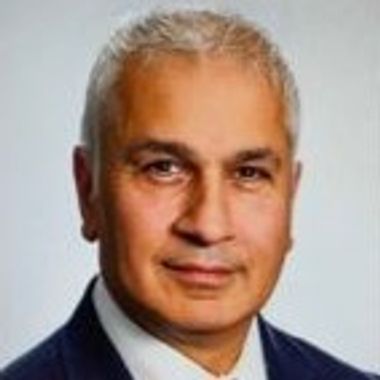Robotic Arthroplasty Systems - Current and Future Innovations
Chairs: Dinesh Nathwani & Fred Picard
Robotic arthroplasty systems represent a noteworthy advancement and certainly a disruption in Orthopaedic Surgery. These systems combine robotics, computer navigation, and advanced imaging technologies to enhance the precision and accuracy of joint replacement surgeries, leading to better patient outcomes, faster recovery times and better long-term survivorship. Robotic systems allow surgeons to create true personalisation in alignment and implant placement. The plans are based on advanced imaging techniques such as CT scans for pre-operative systems whereas intra-operative systems are anatomical landmark data collection based. During surgery, the robot assists the surgeon in executing this plan with a high level of accuracy, guiding the placement of implants, and ensuring optimal alignment and position.
Many robotic systems offer real-time feedback to the surgeon, providing data on bone cuts, implant positioning, and soft tissue balancing throughout the procedure. This feedback allows for adjustments to be made intraoperatively enabling the creation of patient-specific implants tailored to the individual's anatomy. Advanced robotic systems incorporate techniques for assessing and managing soft tissue tension during surgery. This allows surgeons to achieve optimal balance and stability in the joint, which is crucial for long-term implant success and patient satisfaction.
Robotic arthroplasty systems often collect and offer the opportunity to analyse data from each procedure, contributing to a growing database of surgical outcomes. Machine learning algorithms can then be applied to this data to identify trends, refine surgical techniques, and improve patient selection criteria. Some of these systems are becoming smaller and more portable allowing surgeries to be performed in smaller facilities with smart hand-held tools.
The future of this technology is promising. Integration with advanced imaging modalities such as MRI or intraoperative CT could provide even more detailed anatomical information to guide surgical planning and execution. Continued advancements in robotics and artificial intelligence may enable greater levels of automation in joint replacement surgery, with robots performing certain aspects of the procedure autonomously under the supervision of the surgeon.
Future systems may incorporate sensors capable of providing real-time biomechanical feedback, allowing surgeons to assess joint stability and function with greater precision during surgery. By integrating with wearable sensors and digital health platforms, robotic systems could facilitate the development of personalized rehabilitation protocols tailored to each patient's specific surgical outcome and recovery trajectory. Augmented reality (AR) technology could be integrated into robotic systems to provide surgeons with enhanced visualization and guidance during surgery. AR overlays have the potential to display real-time anatomical information directly onto the surgical field, improving spatial awareness and facilitating more precise implant placement.
The robotic arthroplasty systems are ushering in an era of safer, more personalized, and more effective joint replacement surgeries. As technology continues to evolve, it's likely that we'll see continued convergence of robotics, artificial intelligence, leading to improve patient care and outcomes.
Agenda:
Features key clinical leaders using the current leading systems and an overview from leading academics involved in development:
16:30 - 16:38 Welcome & Introduction Fred Picard & Dinesh Nathwani
16:38 - 16:50 CORI current & future innovation Dinesh Nathwani
16:50 - 17:02 VELYS current & future innovation Ben Bloch
17:02 - 17:14 ROSA current & future innovation Akash Sharma
17:14 - 17:26 MAKO current & future innovation Nick Ohly
17:26 - 17:38 Future Orthopaedic Technologies on the Horizon Ferdinando Rodriguez y Baena
17:38 - 18:00 Roundtable discussion Fred Picard & Kamal Deep
×

Benjamin Bloch
Consultant Orthopaedic Surgeon, Nottingham University Hospitals
Mr Benjamin Bloch is a Consultant Orthopaedic Surgeon with a special interest in hip and knee surgery.
He studied medicine at Imperial College School of Medicine in London and qualified in 2003, going on to complete his orthopaedic training in the East Midlands Deanery in Leicester and Northamptonshire. He then completed a further 18 months subspecialist training in hip and knee surgery in Nottingham and Coventry.
Benjamin Bloch has been working as an NHS and private Consultant Orthopaedic Surgeon in Nottingham since 2016. He performs a large number of hip and knee replacements – over 250 per year. He has an interest in revision hip and knee replacements and the treatment of the young patient with an arthritic knee. He can offer treatments suitable for the younger patient including cartilage regeneration techniques, knee osteotomy, unicompartmental knee replacement and patell-femoral joint replacements where clinically appropriate.
He is actively involved in research into hip and knee surgery. He has published in respected orthopaedic journals and presented work at international meetings. He also peer-reviews articles for the Bone and Joint Journal.
He is an active member of the British Orthopaedic Association (BOA).
Benjamin Bloch is one of the Consultants responsible for running the East Midlands Specialist Orthopaedic Network meeting and maintains a keen interest in monitoring the outcomes of surgery. This experience ensures that he stays up to date and practices evidence-based medicine – particularly important when choosing implants and when offering new treatments.
With his background and interests, Benjamin Bloch is a keen and able educator. He regularly gives lectures to medical students, doctors in training and allied health professionals. He is keen to share best, evidence-based practice and work with innovative technologies to advance orthopaedic care.
×

Kamal Deep
Consultant Orthopaedic Surgeon & Hon Senior Clinical Lecturer, Golden Jubilee Hospital NHS Trust, Glasgow, Scotland
Field of interest in use of robotics and computer aided navigation in Hip and Knee Joint arthroplasty
A pioneer and expert in technology, internationally renowned authority on subject of computer navigation and robotics has been invited faculty in many International and National conferences all over the world.
Performed live surgery in International meetings including the Telecast of surgery ``Computer Aided Navigation in Total Knee Replacement``
Published extensively in international and national journals of repute including Nature and chapters in multiple books.
He is on the Expert panel of reviewers of prestigious orthopaedic journals and meetings
Presented his research work in more than 200 conferences and meetings.
Founder of and serves on Executive Board and Lead for Hip Arthroplasty of The British Society for Computer aided Orthopaedic surgery - CAOS UK and
Serves on Executive Board of The International Society for Computer aided Orthopaedic surgery – CAOS International.
Uses computer navigation and robotics for Knee and Hip joint replacement surgery.
×

Dinesh Nathwani
President CAOS UK, Consultant Orthopaedic Surgeon & Hon Senior Lecturer & Lead for Orthopaedic Robotics , Imperial Healthcare NHS, Trust Charing Cross & St Mary's Hospitals, Cleveland Clinic, London.
Mr Dinesh Nathwani is the current President of CAOS UK. He is a Consultant and Hon Senior Clinical Lecturer at Imperial College Healthcare NHS Trust and Robotics Lead at Cleveland Clinic London. He has a keen clinical and research interest in technology assisted knee surgery and has used Navigation and Robotics for all his partial and Total knee replacements since being appointed as a substantive Knee Consultant at Imperial College Healthcare in 2004. This was following a fellowship in Knee Navigation techniques in Perth, Western Australia. He is involved in international trials for novel cartilage resurfacing implants, customised and robotically assisted knee replacements. He is a programme committee member of Computer assisted Orthopaedic Surgery (CAOS) International. He is an Orthopaedic research advisor for the Hamlyn Centre of Robotics at Imperial College and faculty member on several national and international knee reconstruction course teaching surgeons of all grades in Robotic Knee Surgery. He is a reviewer for several Orthopaedic Journals including British Bone & Joint Journal, American Journal of Sports Medicine, The Knee, and Injury.
×
Nick Ohly
Consultant Orthopaedic Surgeon, Golden Jubilee University National Hospital
Nick completed postgraduate training in Glasgow and Edinburgh, followed by a hip and knee fellowship at the University of British Columbia in Vancouver. He was appointed as a consultant at the Golden Jubilee in 2014. He runs a specialised elective-only practice focused exclusively on hip and knee arthroplasty, with sub-specialist interests in robotic and computer-assisted surgery, and complex and revision knee arthroplasty.
×

Frédéric Picard
Consultant Orthopaedic Surgeon
Mr. Frédéric Picard, MD, MSc, FRCS a.k.a Fred Picard has been Orthopaedic Consultant at the Golden Jubilee National Hospital in Glasgow since July 2005 and served as its Director of Orthopaedic Research for 10 years. He worked in Orthopaedic units in Grenoble, Lyon, Paris in France and Chicago, Pittsburgh in the United States of America and has been involved in Computer Assisted Orthopaedic Surgery (CAOS) since its inceptions. He is member of several national and international orthopaedic societies and is past president of the CAOS UK society. He has more than 180 peer reviewed publications, more than ten book chapters, was editor of two books on Computer Assisted Technology and registered six patents.
The basic research of Dr. Picard at the University of Grenoble in the nineties have been the fundamentals for the technical constructions of the first routine CT-free knee navigation system for Total Knee Arthroplasty. On January 21, 1997, he performed the first ever knee replacement in the world with this technology. He has been recognized as a “Lead User Developer of Radical Innovation in the Field of Medical Equipment Technology”. He is Professor Associate at the biomedical engineering department of Strathclyde University of Glasgow. Dr. Picard received multiple awards including the Muller award, the highest recognition in Computer Assisted Surgery, in 2009 in Boston, MA (USA) and the NHS 70 heroes award in Scotland.
×

Ferdinando Rodriguez y Baena
Professor of Medical Robotics, Department of Mechanical Engineering, Imperial College
Ferdinando Rodriguez y Baena is Professor of Medical Robotics in the Department of Mechanical Engineering at Imperial College, where he leads the Mechatronics in Medicine Laboratory and the Applied Mechanics Division. He has been the Engineering Co-Director of the Hamlyn Centre, which is part of the Institute of Global Health Innovation, since July 2020. He is a founding member and great advocate of the Imperial College Robotics Forum, now the first point of contact for roboticists at Imperial College.
His 20-strong team of staff and PhD students has a translational focus, though their work encompasses both “blue skies” research and “near-to-market” development. He was the Chair of the Programme Committee for the International Society for Computer Assisted Orthopaedic Surgery (CAOS International) and CAOS UK, and now of the Hamlyn Symposium; He was the founding Chair of the IET’s Communities Committee for Technical Networks (CC TN), a Leverhulme Prize winner (engineering), a former ERC grant holder, and the coordinator of an €8.3M European project on robotic-assisted neurosurgical drug delivery (EDEN2020) and a UKRI THT Programme Grant on Endoluminal robotics (THT ROBOGAST). He has published over 200 papers and secured in excess of £20M in research funding to date.
×

Akash Sharma
Consultant Orthopaedic Surgeon, Royal Orthopaedic Hospital
Mr Sharma is a Consultant Orthopaedic Surgeon at the Royal Orthopaedic Hospital. He qualified with a Distinction in Clinical Practice from St. Georges Hospital Medical School, London in 2007 and undertook his Basic Surgical Training in London and Oxford. He went on to complete his higher surgical training in the West Midlands on the Birmingham rotation and obtained his FRCS (Trauma and Orthopaedics) in 2016. Mr Sharma completed his highly competitive advanced knee fellowships from both the Nuffield Orthopaedic Centre in Oxford and Nottingham University Hospitals.
Mr Sharma has a specialist interest in all aspects of knee surgery, including partial knee replacements, total knee replacements and failed knee replacements. He strives to use the latest technologies and advancements in orthopaedics to personalise the best surgical outcome for his patients and where possible uses robotic surgery. His robotic experience entails using the Robotic Surgical Assistant (ROSA®) by Zimmer Biomet and his experience with other robotics systems is broadening.
He is the chair of the Modern Interventions Panel at the Royal Orthopaedic Hospital and is the Surgical Lead for same day discharge following knee replacement surgery at his Trust. Mr. Sharma has been awarded three academic prizes and has a strong research background in both clinical and basic sciences. He has co-authored a number of book chapters and enjoys lecturing regularly for undergraduates.













